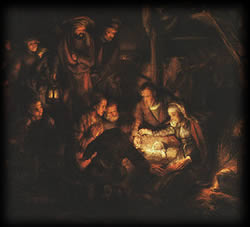 |
| The
adoration
of the shepherds (detail) Rembrandt van Rijn, 1646 |
Christmas
is a Christian holiday that celebrates the birth of Jesus Christ, held
by believers to be the son of God. It is observed by most western Christians and members of the Greek Orthodox community on the 25th of December, whereas Eastern Orthodox, Armenian and Ethiopian Christians celebrate it on the 6th (Armenian) or 7th of January (see Theophany).
The story of Christmas comes chiefly from the Gospels of Saint Luke and
Saint Matthew in the Christian New Testament. According to Luke, an angel
appeared to shepherds outside the town of Bethlehem and informed them
of Jesus’ birth. In Matthew’s account wise men known as the
Magi followed a bright star that led them to Jesus. Nativity plays and
tableaus are common features of Christmas festivities, and many homes
display tiny nativity creches which depict the birth of the holy child
in a manger attended by Mary and Joseph, the wise men and the shepherds
and surrounded by animals.
The exact day of Jesus’ birth has never been pinpointed. It has been said that December was chosen in an attempt to compete against other religions: the 25th was sacred to the Romans as part of their Saturnalia festival, and the Persians celebrated the birth of their own hero saviour Mithra on that day.
Eventually the Church would work the merriment, lights, and gifts from the Roman Saturnalia festival into the celebration of Christmas, but in 137 CE the Bishop of Rome ordered that Christ’s birthday should be celebrated as a solemn feast. In 350 CE another pope, Julius I, choose 25 December as the day Christmas was to be observed.
By 1100 CE, Christmas had become the most important religious festival in Europe. During the 1400s and 1500s, many artists painted scenes of the Nativity. The popularity of Christmas grew until the Reformation, the religious movement of the 1500s that gave birth to Protestantism. During the Reformation, many Christians began to consider Christmas a pagan celebration because it included non-Christian customs. During the 1600s Christmas was outlawed in England and in parts of the English colonies in America. The old customs of feasting and decorating, however, soon reappeared, to be incorporated into the more Christian aspects of the celebration.
The word “Xmas” is sometimes used to stand in for “Christmas”. This tradition began in the early Christian church; the first letter of Christ’s name in Greek is X, and was frequently used at the time as a holy symbol.